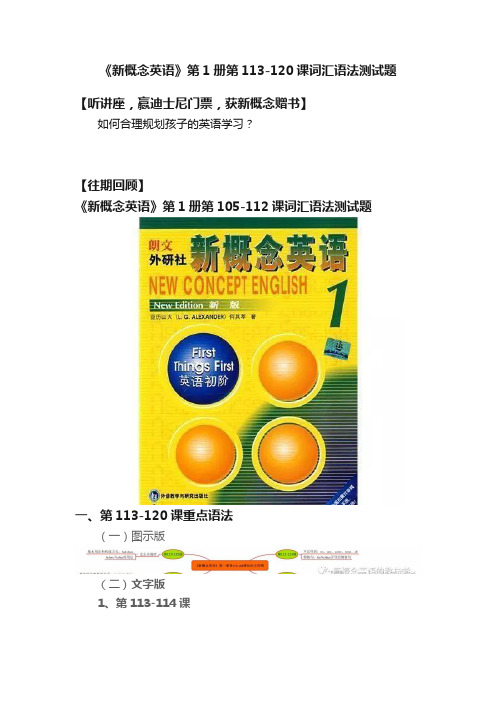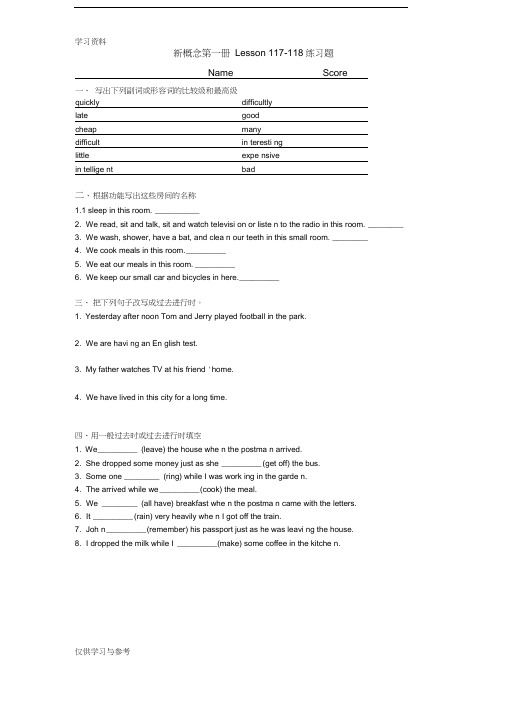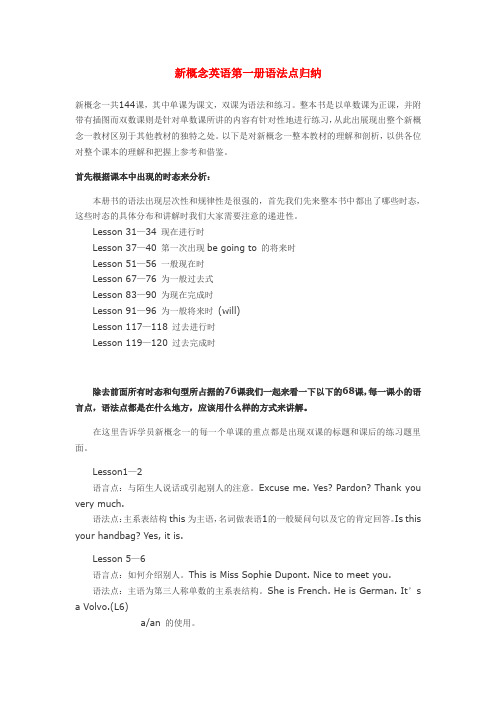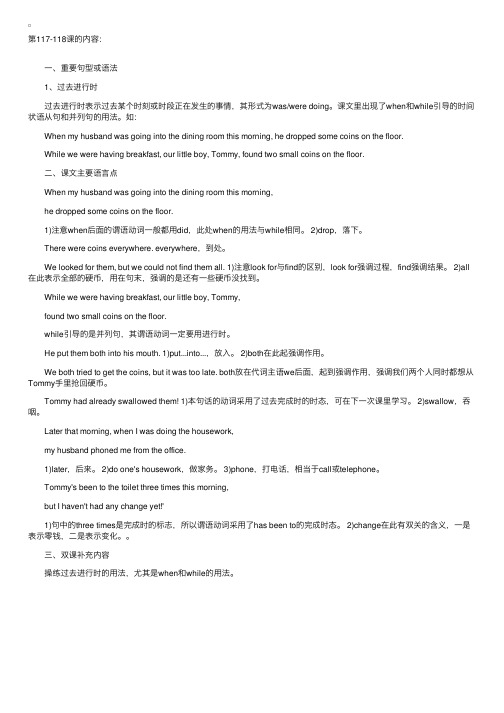新概念1_117课-123课语法练习
新概念英语第一册自学笔记含课后练习答案:Lesson 117-118

新概念英语第一册自学笔记含课后练习答案:Lesson117-118新概念英语第一册117-118课课文重难点详解 further notes onthe text1.look for,寻找(强调动作过程);find,找到(强调寻找的结果)。
2.tommy had already swallowed them! 汤米已经把硬币咽了下去!句中用了过去完成时形式 had swallowed。
过去完成时用来表示过去两个动作中发生在前的那个动作。
显然,句中咽下硬币的动作发生在夫妇俩能够把硬币从汤米手中抢过来之前。
3.later that morning,那天上午的晚些时候。
later是副词late的比较级。
4.any changechange是个多义词,既有“零钱”的意思,也有“变化”的意思。
此处既可指“硬币”;也可指“情况的变化”。
这是双关(pun /p)n/)修辞法。
新概念英语第一册117-118课语法知识点 grammar in use过去实行时构成: be的过去式+现在分词。
过去实行时表示过去某时正在实行的情况或动作。
过去实行时和一般过去时经常在同一个句子里使用。
过去实行时表示过去正在实行的情况或动作,一般过去时则表示比较短暂的动作或事件。
过去实行时的时间状语从句一般由when,while及(just)as等来引导,说明主句中动作发生时的背景。
此外,可用 while或 at the time等强调同时实行的两种或几种动作。
请看例句:when i was doing the housework, my husband telephoned mefrom the office.当我正在干家务时,我丈夫从办公室打电话给我。
while i was listening to the stereo, my mother came into the room.我正在听立体声节目时,我母亲进房间了。
just as she was cleaning her shoes, george knocked at the door.她正在擦鞋时,乔治敲门了。
《新概念英语》第1册第113-120课词汇语法测试题

《新概念英语》第1册第113-120课词汇语法测试题
【听讲座,赢迪士尼门票,获新概念赠书】
如何合理规划孩子的英语学习?
【往期回顾】
《新概念英语》第1册第105-112课词汇语法测试题
一、第113-120课重点语法
(一)图示版
(二)文字版
1、第113-114课
1.1 不定代词:no、any、some、none、
all1.2 倒装句:So/Neither引导的倒装句
2、第115-116课
2.1 不定代词2.1.1 复合不定代词2.1.2 由
some、any、no、every与body、one、
thing、where组合而成的不定代词
3、第117-118课
3.1 过去进行时3.1.1 基本用法和构成方
式:was/were doing3.1.2 when、while与
just as的用法
4、第119-120课
4.1 过去完成时4.1.1 基本用法和构成方
式:had done4.1.2 before与after的用法二、第113-120课核心词汇和重点语法测试题
【注】
1、因篇幅所限,本套测试题未能覆盖所有核心词汇,但重点语法基本都覆盖了。
新概念第一册Lesson117-118练习题讲解学习

二、根据功能写出这些房间的名称1.1 sleep in this room. __________2. We read, sit and talk, sit and watch televisi on or liste n to the radio in this room. ________3. We wash, shower, have a bat, and clea n our teeth in this small room. ________4. We cook meals in this room. _________5. We eat our meals in this room. _________6. We keep our small car and bicycles in here. _________三、把下列句子改写成过去进行时。
1. Yesterday after noon Tom and Jerry played football in the park.2. We are havi ng an En glish test.3. My father watches TV at his friend 'home.4. We have lived in this city for a long time.四、用一般过去时或过去进行时填空1. We _________ (leave) the house whe n the postma n arrived.2. She dropped some money just as she _________ (get off) the bus.3. Some one ________ (ring) while I was work ing in the garde n.4. The arrived while we _________ (cook) the meal.5. We ________ (all have) breakfast whe n the postma n came with the letters.6. It _________ (rain) very heavily whe n I got off the train.7. Joh n _________ (remember) his passport just as he was leavi ng the house.8. I dropped the milk while I _________(make) some coffee in the kitche n.仅供学习与参考。
新概念英语第一册Lesson117-118笔记(语法点+配套练习+答案)

put ... into ...
把...放到
have/has been to
曾去过某地
四、语法解析
1.现在进行时:说话此刻正在发生
结构:be (am/is/are) + v.ing
时间标志词:Look! Listen! now, at the moment
练习:
1.One of themis taking(take) photos for us now.
11.Didyoufinish(finish) your homework yesterday?
12.Her motherdidn’t give(not give) the girl any present.
13.When hewent(go) back to England, hewass(be) very tired.
The childrenwereallhappy.
Bothof the twins wanted to go to the theatre.
Allof my classmates are invited to my party.
three times三次
现在完成时的标志词
twice两次
once一次
have/has been to去过某地,已回
have/has gone to去了某地,未回
My father isn't at home, hehas gone toBeijing.
Mr Wang isn't here.Hehas gone toQingdao.
My fatherhas been toBeijing twice.
Ihaveneverbeen tothe Great Wall.
新概念英语第一册语法及专项练习

新概念英语第一册语法点归纳新概念一共144课,其中单课为课文,双课为语法和练习。
整本书是以单数课为正课,并附带有插图而双数课则是针对单数课所讲的内容有针对性地进行练习,从此出展现出整个新概念一教材区别于其他教材的独特之处。
以下是对新概念一整本教材的理解和剖析,以供各位对整个课本的理解和把握上参考和借鉴。
首先根据课本中出现的时态来分析:本册书的语法出现层次性和规律性是很强的,首先我们先来整本书中都出了哪些时态,这些时态的具体分布和讲解时我们大家需要注意的递进性。
Lesson 31—34 现在进行时Lesson 37—40 第一次出现be going to 的将来时Lesson 51—56 一般现在时Lesson 67—76 为一般过去式Lesson 83—90 为现在完成时Lesson 91—96 为一般将来时(will)Lesson 117—118 过去进行时Lesson 119—120 过去完成时除去前面所有时态和句型所占据的76课我们一起来看一下以下的68课,每一课小的语言点,语法点都是在什么地方,应该用什么样的方式来讲解。
在这里告诉学员新概念一的每一个单课的重点都是出现双课的标题和课后的练习题里面。
Lesson1—2语言点:与陌生人说话或引起别人的注意。
Excuse me. Yes? Pardon? Thank you very much.语法点:主系表结构this为主语,名词做表语1的一般疑问句以及它的肯定回答。
Is this your handbag? Yes, it is.Lesson 5—6语言点:如何介绍别人。
This is Miss Sophie Dupont. Nice to meet you.语法点:主语为第三人称单数的主系表结构。
She is French. He is German. It’s a Volvo.(L6)a/an 的使用。
Lesson 7—8语言点:如何自我介绍和相互认识。
新概念英语第一册第117-118课重点语法

第117-118课的内容: ⼀、重要句型或语法 1、过去进⾏时 过去进⾏时表⽰过去某个时刻或时段正在发⽣的事情,其形式为was/were doing。
课⽂⾥出现了when和while引导的时间状语从句和并列句的⽤法。
如: When my husband was going into the dining room this morning, he dropped some coins on the floor. While we were having breakfast, our little boy, Tommy, found two small coins on the floor. ⼆、课⽂主要语⾔点 When my husband was going into the dining room this morning, he dropped some coins on the floor. 1)注意when后⾯的谓语动词⼀般都⽤did,此处when的⽤法与while相同。
2)drop,落下。
There were coins everywhere. everywhere,到处。
We looked for them, but we could not find them all. 1)注意look for与find的区别,look for强调过程,find强调结果。
2)all 在此表⽰全部的硬币,⽤在句末,强调的是还有⼀些硬币没找到。
While we were having breakfast, our little boy, Tommy, found two small coins on the floor. while引导的是并列句,其谓语动词⼀定要⽤进⾏时。
He put them both into his mouth. 1)put...into...,放⼊。
2)both在此起强调作⽤。
新概念1册-117课-课件加练习教学提纲
While the childr源自n were playing in the garden ,it began to rain.
正当孩子们在院子里玩的时候,天开始下雨了。
4.We both tried to get the coins, but it was too late.我们俩 都试图把这两枚硬币拿出来,但太迟了。 【注释】both 表示“两个都···”,如: They both want to go to France. 他们俩都想去法国。 【联记】三者或三者以上都用all。这两个词都用在人称代 词之前时必须加of,即both/all +of+人称代词宾格: Both of you are right. =You are both right. 你们俩都是对的。
“Would you like a cup of tea?” he asked. 她问她妈妈:“我的书包在哪里?”
She asked her mother:“ Where is my bag?”
6.Tommy’s been to the toilet three times this morning, but I haven’t had any change yet!今天上午Tommy去了三次 厕所了,但我还没看到硬币! 【分析】but连接的并列句,three times 作前一个分句的 频度状语。
She was looking for her passport yesterday. 昨天她在找他的护照。 Did she find it? 找到了吗? Yes,she find it under the chair. 找到了,他是在椅子地下找到的。
3.While we were having breakfast, our little boy , Tommy, found two small coins on the floor.正当我们吃早饭时,我 们的小男孩汤米在地上找到了两枚小硬币。 【分析】主从复合句,while 引导时间状语从句, Tommy 作our little boy 的同位语。 【例句】While she was cleaning the room, her husband telephoned her.
新概念英语一 1-36课语法知识点总结复习以及相应习题
新概念英语一 1-36课语法知识点总结复习以及相应习题初一上学期新概念复资料以下是英语国际音标表中的48个音标,其中包括20个元音和28个辅音。
元音(20个)长元音:/ɑ:/,/ɔ:/,/ɜ:/,/i:/,/u:/短元音:/ʌ/,/ɒ/,/ə/,/ɪ/,/ʊ/,/e/,/æ/双元音:/eɪ/,/aɪ/,/ɔɪ/,/ɪə/,/eə/,/ʊə/辅音(28个)轻辅音:/p/,/t/,/k/,/f/浊辅音:/b/,/d/,/g/,/v/,/z/,/ð/,/ʒ/,/ʃ/,/tr/,/dr/,/ts/,/dz/鼻音:/m/,/n/,/ŋ/半元音:/j/,/w/边音:/r/,/h/,/tʃ/,/dʒ/在语法方面,人称代词分为一人称、二人称和三人称。
以下是各个人称代词的形式:一人称代词:I(主格),me(宾格),my/mine(形容词性物主代词)二人称代词:you(主格和宾格),your/yours(形容词性物主代词)三人称代词:he/him(男性)、she/her(女性)、it(中性)、they/them(复数)(主格和宾格),his/hers/its(形容词性物主代词)在句子中,人称代词的位置取决于其在句子中的作用。
主格代词通常出现在句子的主语位置,而宾格代词通常出现在动词或介词后面。
形容词性物主代词相当于形容词,必须在后面加上名词。
例如:I am a student.(我是学生。
)It is a bird.(它是一只鸟。
)She is a XXX.(她是老师。
)You look nice.(你看起来很好看。
)They are friends.(他们是朋友。
)当多个人称代词并列作为主语时,单数形式(第二、第三、第一人称)应该按照顺序排列,如you。
he and I;复数形式(第一、第二、第三人称)应该按照顺序排列,如we。
you and they。
例如:A。
She。
you and I are playing cards in the XXX.(她、你和我正在花园里玩牌。
新概念英语第一册随堂练习— Lesson117~118(有答案)
Lesson 117---Lesson 118随堂练习一、填空1.饭厅________________________2.吞下_________________________3.硬币________________________4.厕所_________________________5.晚些时候____________________6.in the afternoon ________________7.零钱________________________二、按要求写出下列词的正确形式1.drop_________(现在分词) 6.joke ____________(现在分词)2.try __________ (现在分词) 7. slip______________(过去式)3.have __________(过去式) 8.be _______________(过去分词)4.cut ___________(过去式) 9. get_____________ (现在分词)5.leave_________(现在分词) 10.hurt____________(过去式)三、选择填空( )1. He cut_________ while he was shaving .A. himB. hisC. himsel fD. it( )2. We were reading the newspaper_______ suddenly the light went out.A when B. while C. before D. after( )3.I _______my pen everywhere but I couldn't ______it.A. looked for,foundB.found,looked forC. looked for,findD. find, look for( )4. Someone knocked________the door when I was watching TV.A at B.in C.for D. to( )5.While she __________TV in the sitting room, the bell___________.A.watches, ringsB. is watching: rangC. was watching, rangD.watched,was ringing( )6. He often phones me________his office.A.inB.atC. forD. from( )7. She_______herself while she________off the bus.A. hurt; was gettingB.hurts;was gettingC. hurt; is gettingD. hurts; is getting( )8.---Is there________in the bag?---No, there is________.A, something; anything B. anything;nothingC.anything;somethingD. something;nothing( )9. When he_______,I________a bath.A. arriving; was havingB. arrived; am havingC. arrived; was havingD. arrives; was having( )10. Have you ever_______Shenzhen?A. been toB. gone toC. went toD.gone in四、连词成句1. opening, I, as, just, was, the, rang, door, phone ,the(.)_______________________________________________________________2.already, we, to, been, three, have, times, Shanghai(.)________________________________________________________________3.cooking, while, I, dinner, the, was, he, working, was, garden, the, in(.) ________________________________________________________________4. doing, you, what, were, watching, when, was , I,TV(?)________________________________________________________________五、汉译英1.他把两枚硬币全都放进了嘴里。
新概念一练习Lesson 117-120
9 My brother was a letter at half past four yesterday afternoon. (write)
10 The children was on the groud when I saw them . (sit)
二 选词填空
as cleaning called bolied walking later for swallowing dropped
noise 1. Sam had TV before he did his homework. 2. Many people didn’t ____ the museum this morning. 3. “What’s ____, George?” he called when he saw George. 4. This story ____ in 1987. 5. It is too ____ for me to see something. 6. He heard a ____ somewhere under his window. 7. It was too late. She had already the door. 8. When she knocked at the door, I was a letter. 9. My teacher gave us our exercise books after he had them. 10. The little child to his mother after he had been her. 三. 按要求改写句子
both
1. I looked ____ it for two days. But I haven’t found it yet. 2. She ____ her
- 1、下载文档前请自行甄别文档内容的完整性,平台不提供额外的编辑、内容补充、找答案等附加服务。
- 2、"仅部分预览"的文档,不可在线预览部分如存在完整性等问题,可反馈申请退款(可完整预览的文档不适用该条件!)。
- 3、如文档侵犯您的权益,请联系客服反馈,我们会尽快为您处理(人工客服工作时间:9:00-18:30)。
(117-123)过去进行时、过去完成时、定语从句课堂练习
I.用一般过去时or过去进行时填空
1. She dropped some money while she ______________________ (get off) the bus. (当她正下车过程中)
【rang,rung】) while I was working in the garden.
3. They arrived while we _______________________ (cook) the meal. (当我们正在做饭时)
4. We _____________________________ (have) breakfast when the postman came with the letters.
5. When I visited them, they _______________________________ (watch) televion.
II. 根据中文提示回答问题(过去进行时)
1. What were you doing when the teacher came into the classroom this morning? (答:正在看书/正在写作业/正在说话)
2. What happened while you were having breakfast this morning? (我的鹦鹉大叫起来/ 一个贼爬进我的厨房/ 我儿子吃了3枚硬币)
3. Did you meet someone while you were going home from school yesterday? (答:遇见了Susan/ 我的老师/ 我的经理) III. 用过去完成时填空
1. We _________________________ (already leave) the house when the postman arrived.
2. She _________________________ (already hear) the news before her friend told her.
3. Jim asked for a glass of beer, but they _______________________ (drink) all of it! (drink【drank,drunk】)
4. I went to sleep after I ____________________________ (clean) my teeth.
5. Before I got there, they ____________________________ (eat) everything!
IV. 定语从句who, whom, which, that
1. Which girl are you looking for?
2. Which doctor did you phone last night?
(She served me yesterday) (He lives in our street.)
3. Which actress are you talking about?
4. Which car did you want to buy?
(We saw her in a film last week.) (They sold it yesterday.)
5. Which skirt would you like to try?
6. Which nurse is Lucy?
(The dress is blue.) (Lucy is wearing a hat.)
I.用一般过去时or过去进行时填空
1. She dropped some money while she ______________________ (get off) the bus. (当她正下车过程中)
【rang,rung】) while I was working in the garden.
3. They arrived while we _______________________ (cook) the meal. (当我们正在做饭时)
4. We _____________________________ (have) breakfast when the postman came with the letters.
5. When I visited them, they _______________________________ (watch) televion.
II. 根据中文提示回答问题(过去进行时)
1. What were you doing when the teacher came into the classroom this morning? (答:正在看书/正在写作业/正在说话)
2. What happened while you were having breakfast this morning? (我的鹦鹉大叫起来/ 一个贼爬进我的厨房/ 我儿子吃了3枚硬币)
3. Did you meet someone while you were going home from school yesterday? (答:遇见了Susan/ 我的老师/ 我的经理) III. 用过去完成时填空
1. We _________________________ (already leave) the house when the postman arrived.
2. She _________________________ (already hear) the news before her friend told her.
3. Jim asked for a glass of beer, but they _______________________ (drink) all of it! (drink【drank,drunk】)
4. I went to sleep after I ____________________________ (clean) my teeth.
5. Before I got there, they ____________________________ (eat) everything!
IV. 定语从句who, whom, which, that
1. Which girl are you looking for?
2. Which doctor did you phone last night?
(She served me yesterday) (He lives in our street.)
3. Which actress are you talking about?
4. Which car did you want to buy?
(We saw her in a film last week.) (They sold it yesterday.)
5. Which skirt would you like to try?
6. Which nurse is Lucy?
(The dress is blue.) (Lucy is wearing a hat.)。
